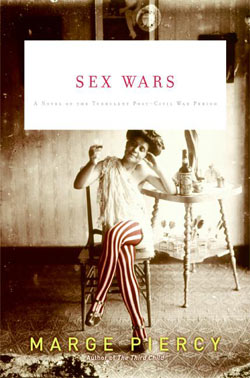
 |
by Natasha Beck
Prolific
novelist and poet Marge Piercy takes us to a post-Civil War New York City in Sex Wars, a fascinating look at sexuality, the religious right, feminism, immigration and class issues.
Piercy uses both historical and fictional characters to tell stories from their viewpoints. Feminist philosopher and organizer Elizabeth Cady Stanton; spiritualist, feminist and free love proponent Victoria Woodhull; and Christian zealot Anthony Comstock are rendered accurately as the multi-dimensional people they were. Fictional character Freydeh Levin, a Russian Jewish immigrant based on a composite of women from Piercy’s maternal family provides the perspective of a young widow opening her own business in a time of limited job opportunities for women.
 |
Sex Warsby Marge PiercyPublisher: William Morrow Dec 2005 416 Pages ISBN: 0060789832 |
Cady Stanton, usually mentioned in history books along with Susan B. Anthony, was a brilliant passionate woman, a speaker and leader whose feminism grew out of her own life and her work with the abolitionist movement. She had a broad view of social change, addressing a wide variety of issues in her long life: married women’s property rights, divorce, women’s work inside and outside the home, prison reform, women’s reproductive rights, and a feminist view on religion. Although she co-founded the National Women’s Suffrage Association with Anthony in 1869, she viewed suffrage as one of many women’s rights to be achieved.
Victoria Woodhull, who overcame an abusive childhood and early adulthood, is usually described as a somewhat wacky spiritualist who nonetheless became the county’s first woman stockbroker and the first female presidential candidate in 1872. Denied a formal education beyond the eighth grade, she learned from various mentors who guided her in her deep quest for knowledge and empowerment. A deeply sensual woman, she and her second husband James practiced what was then called free love — taking lovers yet maintaining their marriage and family. Unlike most women of the time who were ignorant of their bodies and were considered bad if they sought sexual pleasure, Woodhull appreciated a lover who understood the role of the clitoris in orgasm. The lives of Woodhull, Woodhull’s sister Tennessee Claflin, Cady Stanton and Anthony intersect as they must defend themselves from the onslaught of Comstock. Levin is also affected as she has learned to make rubber condoms in her house and sells them to pharmacies and high-class brothels.
Anthony Comstock was an ordinary, hard-working man who became a religious zealot determined to stamp out contraceptives, abortion, pornography, and prostitution. He was a long-time opponent of feminism and considered women delicate creatures who should stay at home and be protected from the evils of the larger world. Through his work with the YMCA, he was able to influence legislators to pass what came to be known as the Comstock Laws which criminalized providing or advertising contraception, among other things. He thoroughly enjoyed putting book and condom sellers out of business. He didn’t differentiate between books on reproduction and pornographic novels and pictures. In addition he was very anti-immigrant, considering them filthy and ignorant.
Piercy makes excellent connections between the attack of the religious right on reproductive rights, civil liberties and free speech as well as the rise of corporate power (Vanderbilt, Fisk and Gould). The parallels to our current situation in the U.S. are apparent; instead of Comstock, we have Jerry Falwell and Pat Buchanan attacking, well, just about everyone who isn’t the same as they are. As in the 1870s, immigrants experience discrimination and the prison population is composed primarily of low-income people.
This is not however, a book of despair. Piercy is honest, at the same time showing that social change is a long process with setbacks and victories along the way. We must seek out new leaders and allies and keep a long-term perspective. I recommend this book to people who enjoy history lively and real.
Natasha Beck is a local activist and teacher. She would like to thank the Salmon Street Wednesday night writing group for support.
|
The Portland Alliance
2807 SE Stark Portland,OR 97214 Last Updated: March 5, 2006 |